No products in the cart.
APSET Chemical Sciences Previous Years Solved Questions (Chapter-Wise) By Dr. D. Rama Sekhara Reddy & Mr. Naresh Babu Gatchakayala
₹770.00
Title of the Book: APSET Chemical Sciences Previous Years Solved Questions
Author(s): Dr. D. Rama Sekhara Reddy & Mr. Naresh Babu Gatchakayala
Edition: First
Book Price: 770/-
Publications: LNIG PUBLICATIONS
Nature of Book/Binding: Xerox
Book Language: English
Brand Name: Laborious New Innovators Group
Number of pages: 482
Description
Contents of the Book:
I. INORGANIC CHEMISTRY:
Unit-1: Chemical periodicity.
Unit-2: Structure and bonding in homo- and heteronuclear molecules, including shapes of molecules (VSEPR Theory).
Unit-3: Concepts of acids and bases, Hard-Soft acid-base concept, and non-aqueous solvents.
Unit-4: Main group elements and their compounds: Allotropy, synthesis, structure and bonding, industrial importance of the compounds.
Unit-5: Transition elements and coordination compounds: structure, bonding theories, spectral and magnetic properties, reaction mechanisms.
Unit-6: Inner transition elements: spectral and magnetic properties, redox chemistry, analytical applications.
Unit-7: Organometallic compounds: synthesis, bonding and structure, and reactivity. Organometallics in homogeneous catalysis.
Unit-8: Cages and metal clusters.
Unit-9: Analytical chemistry- separation, spectroscopic, electro- and thermoanalytical methods.
Unit-10: Bioinorganic chemistry: photosystems, porphyrins, metalloenzymes, oxygen transport, electron-transfer reactions; nitrogen fixation, metal complexes in medicine.
Unit-11: Characterization of inorganic compounds by IR, Raman, NMR, EPR, Mössbauer, UV-vis, NQR, MS, electron spectroscopy and microscopic techniques.
Unit-12: Nuclear chemistry: nuclear reactions, fission and fusion, radio-analytical techniques and activation analysis.
II. PHYSICAL CHEMISTRY:
Unit-1: Basic principles of quantum mechanics: Postulates; operator algebra; exactly- solvable systems: particle-in-a-box, harmonic oscillator and the hydrogen atom, including shapes of atomic orbitals; orbital and spin angular momenta; tunnelling.
Unit-2: Approximate methods of quantum mechanics: Variational principle; perturbation theory up to second order in energy; applications.
Unit-3: Atomic structure and spectroscopy; term symbols; many-electron systems and antisymmetry principle.
Unit-4: Chemical bonding in diatomics; elementary concepts of MO and VB theories; Huckel theory for conjugated π-electron systems.
Unit-5: Chemical applications of group theory; symmetry elements; point groups; character tables; selection rules.
Unit-6: Molecular spectroscopy: Rotational and vibrational spectra of diatomic molecules; electronic spectra; IR and Raman activities – selection rules; basic principles of magnetic resonance.
Unit-7: Chemical thermodynamics: Laws, state and path functions and their applications; thermodynamic description of various types of processes; Maxwell’s relations; spontaneity and equilibria; temperature and pressure dependence of thermodynamic quantities; Le Chatelier principle; elementary description of phase transitions; phase equilibria and phase rule; thermodynamics of ideal and non-ideal gases, and solutions.
Unit-8: Statistical thermodynamics: Boltzmann distribution; kinetic theory of gases; partition functions and their relation to thermodynamic quantities – calculations for model systems.
Unit-9: Electrochemistry: Nernst equation, redox systems, electrochemical cells; Debye- Huckel theory; electrolytic conductance – Kohlrausch’s law and its applications; ionic equilibria; conductometric and potentiometric titrations.
Unit-10: Chemical kinetics: Empirical rate laws and temperature dependence; complex reactions; steady-state approximation; determination of reaction mechanisms; collision and transition state theories of rate constants; unimolecular reactions; enzyme kinetics; salt effects; homogeneous catalysis; photochemical reactions.
Unit-11: Colloids and surfaces: Stability and properties of colloids; isotherms and surface area; heterogeneous catalysis.
Unit-12: Solid-state: Crystal structures; Bragg’s law and applications; band structure of solids.
Unit-13: Polymer chemistry: Molar masses; kinetics of polymerization.
Unit-14: Data analysis: Mean and standard deviation; absolute and relative errors; linear regression; covariance and correlation coefficient.
III. ORGANIC CHEMISTRY:
Unit-1: IUPAC nomenclature of organic molecules including regio- and stereoisomers.
Unit-2: Principles of stereochemistry: Configurational and conformational isomerism in acyclic and cyclic compounds; stereogenicity, stereoselectivity, enantioselectivity, diastereoselectivity and asymmetric induction.
Unit-3: Aromaticity: Benzenoid and non-benzenoid compounds – generation and reactions.
Unit-4: Organic reactive intermediates: Generation, stability and reactivity of carbocations, carbanions, free radicals, carbenes, benzynes and nitrenes.
Unit-5: Organic reaction mechanisms involving addition, elimination and substitution reactions with electrophilic, nucleophilic or radical species. Determination of reaction pathways.
Unit-6: Common named reactions and rearrangements – applications in organic synthesis.
Unit-7: Organic transformations and reagents: Functional group interconversion including oxidations and reductions; common catalysts and reagents (organic, inorganic, organometallic and enzymatic). Chemo, regio and stereoselective transformations.
Unit-8: Concepts in organic synthesis: Retrosynthesis, disconnection, synthons, linear and convergent synthesis, umpolung of reactivity and protecting groups.
Unit-9: Asymmetric synthesis: Chiral auxiliaries, methods of asymmetric induction – substrate, reagent and catalyst-controlled reactions; determination of enantiomeric and diastereomeric excess; enantio-discrimination. Resolution – optical and kinetic.
Unit-10: Pericyclic reactions – electrocyclization, cycloaddition, sigmatropic rearrangements and other related concerted reactions. Principles and applications of photochemical reactions in organic chemistry.
Unit-11: Synthesis and reactivity of common heterocyclic compounds containing one or two heteroatoms (O, N, S).
Unit-12: Chemistry of natural products: Carbohydrates, proteins and peptides, fatty acids, nucleic acids, terpenes, steroids and alkaloids. Biogenesis of terpenoids and alkaloids.
Unit-13: Structure determination of organic compounds by IR, UV-Vis, 1H & 13C NMR and Mass spectroscopic techniques.
INTERDISCIPLINARY TOPICS:
Unit-1: Chemistry in nanoscience and technology.
Unit-2: Catalysis and green chemistry.
Unit-3: Medicinal chemistry.
Unit-4: Supramolecular chemistry.
Unit-5: Environmental chemistry.
About the Author(s):
Dr. D. Rama Sekhara Reddy has been serving as a Head-Department of Chemistry, Executive Council Member, Controller of Examination, and Associate NCC Officer (ANO), Krishna University, Machilipatnam-521004, Andhra Pradesh, India. After taking over as Head of the Department, He has initiated several academic reforms such as public lectures, seminars, workshops, and conferences to enrich the culture of research and teaching. In Gandhian mould, he believes that a classroom should be a base for the complete personality development of a student. With this in mind, Dr. D. Rama Sekhara Reddy strived to also promote sports and cultural activities in the Department.
Dr.D. Rama Sekhara Reddy received graduation (B.Sc.) from V.R. College, Nellore in the year 1998. He obtained a post-graduation (M. Sc) from Acharya Nagarjuna University, Guntur in the year 2001 and he obtained his Ph.D. from the Department of Organic Chemistry, Andhra University, Visakhapatnam, in the year 2009. During his Doctoral Program, he worked as JRF in a DST-sponsored project under the guidance of Prof. R. Venkateswarlu. After completing his doctoral degree in the area of Natural products Chemistry in 2009 from India, he worked as a Post-Doctoral Fellow at the Institute of Biological Chemistry, Washington State University, WA, USA from 2009-2011and continued as a Post-Doctoral Research Associate at the Centre for Pharmacology, Pharmaceuticals, and Pharmacology, The University of Trans-Disciplinary Health Sciences & Technology (Formerly named I-AIM), Bangalore, K.A, India from 2011-2012. Later in the year 2012, he joined as an Assistant Professor in the Department of Chemistry, at GITAM University, Visakhapatnam, A.P, India. Further in the year 2013, he joined as an Assistant Professor in the Department of Chemistry, at Krishna University, Machilipatnam, A.P, India. Currently, he is acting as Head of the Chemistry Department.
Dr. D. Rama Sekhara Reddy is one of the leading resource persons in the world of research and consultancy. He holds his research degree in Natural Product Chemistry. He has guided research scholars for the Ph.D. program. Under his able guidance, two Ph.D. degrees were awarded, three more Ph.D. scholar has submitted theses and waiting for the result and currently, 6 research scholars are working with him. His main research interests include Natural products Chemistry, Organic Synthesis, and Nanochemistry. He published more than 30 research publications in the areas of Natural products Chemistry, Organic Synthesis, and Nanochemistry, in the field of Natural products Chemistry, Organic Synthesis, Nanochemistry, Pharmaceutical Chemistry, and Analytical Chemistry in various national and international journals with a scientific reputation. He is currently serving as a potential reviewer for various Scopus and SCI journals. He is the author of four books and one book chapter. At present, he is a member of the Board of Studies of various reputed Universities and colleges in Andhra Pradesh and India. Earlier he served in different administrative positions in the Directorate of Admissions, Head, Department of Chemistry, Training and Placement officer, etc.
He is visiting/guest faculty of various reputed Universities and colleges in Andhra Pradesh and India. Delivered a number of invited lectures/talks/keynote addresses at different seminars/conferences. He is an Associate Fellow 2018 and Andhra Pradesh Akademi of Sciences.
About the Author(s):
 Mr. Naresh Babu Gatchakayala has been serving as an Assistant Professor (Guest Lecturer), Department of Chemistry, Krishna University, Machilipatnam-521004, Andhra Pradesh, India. After joining as Assistant Professor, He has initiated several academic reforms such as public lectures, seminars, workshops, and conferences to enrich the culture of research and teaching. In Gandhian mould, he believes that a classroom should be a base for the complete personality development of a student. Mr. Naresh Babu Gatchakayala strived to also promote sports and cultural activities in the Department.
Mr. Naresh Babu Gatchakayala has been serving as an Assistant Professor (Guest Lecturer), Department of Chemistry, Krishna University, Machilipatnam-521004, Andhra Pradesh, India. After joining as Assistant Professor, He has initiated several academic reforms such as public lectures, seminars, workshops, and conferences to enrich the culture of research and teaching. In Gandhian mould, he believes that a classroom should be a base for the complete personality development of a student. Mr. Naresh Babu Gatchakayala strived to also promote sports and cultural activities in the Department.
Mr. Naresh Babu Gatchakayala received graduation (B.Sc.) from Acharya Nagarjuna University, Guntur in the year 2008. He obtained a post-graduation (M.Sc.) from Andhra University, Visakhapatnam in the year 2011. He cleared CSIR-UGC-NET under the Lectureship (LS) category with All India 33rd rank in the DEC-2012 session, and in the same year, he also qualified in Andhra Pradesh State Eligibility Test (APSET-2012). Later in the year 2013, he joined as CSIR-UGC-NET CHEMICAL SCIENCES Subject coordinator in the Department of Chemistry, JMJ College for Women, Tenali, A.P, India. Further in the year 2018, he joined as CSIR-UGC-NET CHEMICAL SCIENCES Subject coordinator in the Department of Chemistry, K.V.R., K.V.R. and M.K.R College, Khajipalem, A.P, India. Currently, he is working as an Assistant Professor (Guest) in the Department of Chemistry, at Krishna University, Machilipatnam, India.
Mr. Naresh Babu Gatchakayala is one of the leading resource persons in the world of Teaching, Research, and consultancy. Now he is working as a research scholar under the supervision of Dr. D. Rama Sekhara Reddy in the Department of Chemistry, Krishna University, Machilipatnam, India. He has teaching experience more than 10 years. His main Teaching interests include Inorganic, Organic, and Physical Chemistry. His main research interests include Synthetic Organic Chemistry and Nanochemistry. He worked with “Dr. Chepuri Venkata Ramana Research group, CSIR-National Chemical Laboratory, Pune, India” in part of his research. He published 04 research publications in the areas of Nanochemistry. He is the author of four books.
He is the best motivator, and he visited more than 10 universities and more than 100 Post-Graduated colleges in Andhra Pradesh and delivers his guest talk on “various opportunities and various competitive examinations on chemistry”.
BOOK PUBLISHED & MARKETED BY:
Laborious New Innovators Group’s
LNIG PUBLICATIONS, GUNTUR,
Contact Number: 91+ 8099871707.
Contact mail ID: [email protected]

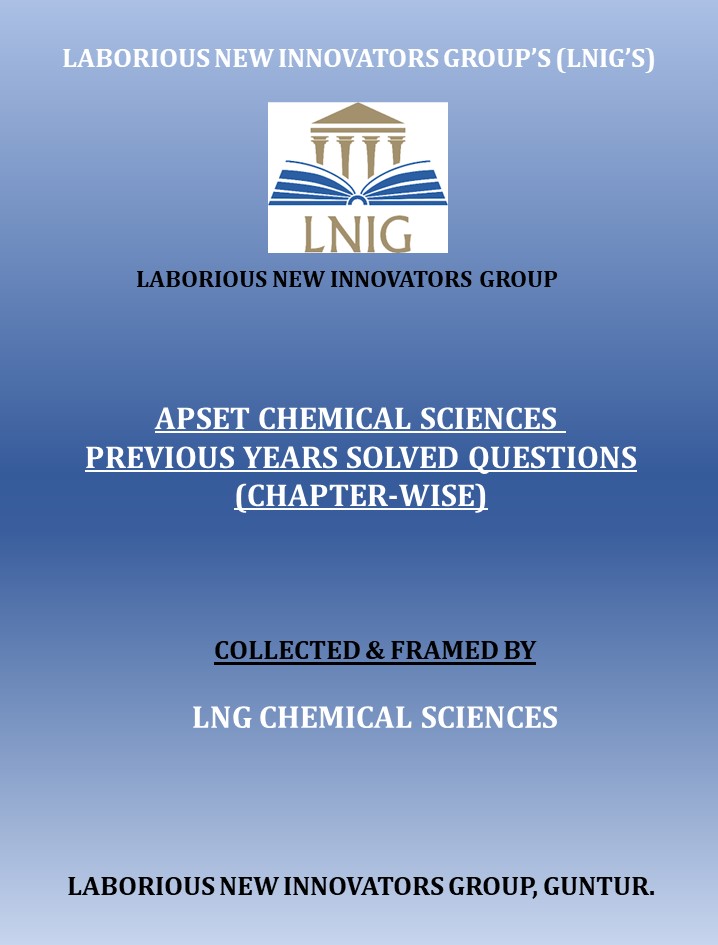
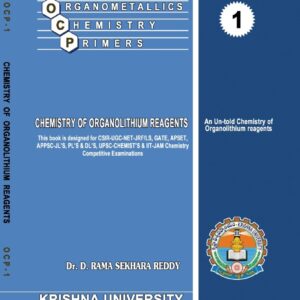
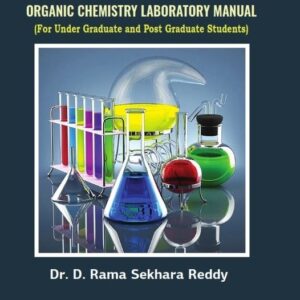
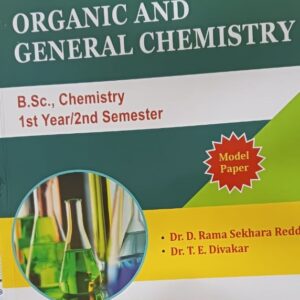
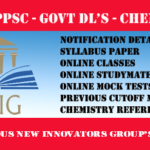
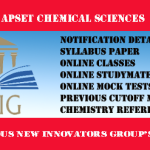
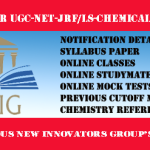

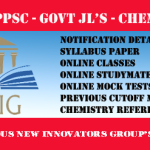
Chu –
It’s fantastic that you are getting thoughts from this piece of writing as well as from your argument made here.
SYMALA GOWRI DEVI –
tremendous issues here. I’m very happy to look at your book. Thank you very much, and I look forward to contacting you. Will you please send me your contact details?
MEGHANA SWETHA –
Thank you for providing me with Dr. D. Rama Sekhara Reddy and Mr. Naresh Babu Gatchakayala’s APSET Chemical Sciences Previous Years Solved Questions (Chapter-Wise). I enjoyed reading it. And I also learned so many shortcuts. I appreciate that you thought of me.
SEETA LAKSHMI –
Thank you for giving me APSET Chemical Sciences Previous Years Solved Questions (Chapter-Wise) By Dr. D. Rama Sekhara Reddy & Mr. Naresh Babu Gachakayala. I learned so many shortcuts.
LAKSHMI KAVYA –
I thoroughly enjoyed the book APSET Chemical Sciences Previous Years’ Solved Questions. The subject matter will help me to solve various APSET Chemical Sciences Previous Year’s Questions, and I learned more shortcuts.
GANESH –
Thank you for the book you gave me last week! You chose a great book for me to prepare for APSET Chemical Sciences. I have already read it and loved the subject matter in it. I enjoyed it so much that I plan to read the entire series.
INDIRA –
I want to thank you for the book you gave me about APSET Chemical Sciences Previous Years’ Solved Questions (Chapter-Wise). I was able to relate to the ways Dr. D. Rama Sekhara Reddy & Mr. Naresh Babu Gatchakayala talk about their subject matter. I am confident that the recommendations for dealing with the topic will be implemented. You were right when you told me that I needed to read APSET Chemical Sciences Previous Years’ Solved Questions (chapter-wise). Getting help from a book is easier for me than discussing problems with my friends.
MADHU SUDANA RAO –
Hey there! I could have sworn I’d been to this book before, but after studying through some of the books, I realized it was new to me. Anyways, I’m definitely delighted I found it, and I’ll be ordering it.
MANIKANTESWARA RAO –
It is currently the sole book available for the APSET Chemical Sciences Entrance Exam. We appreciate the authors.
Pragna –
I read this book fully on the topic APSET Chemical Sciences Previous Years Solved Questions (Chapter-Wise), it’s an awesome book.
Vinod –
This book is worth everyone’s attention. How can I contact you?
LAKSHMI –
I’ve been browsing online for more than 3 hours lately, but I by no means discovered any fascinating books like this. It is a lovely price for me. In my opinion, if all writers produced high-quality content, as you most likely did, the preparation would be far more useful than ever before.
SRAVYANKA –
Good book, thank you so much. This book has been very helpful in my APSET preparation.
RAMANA –
It’s very interesting, I want to purchase this book. Can you tell us more about this? I’d like to find out more details.
BALA RAMESWARI –
I like the valuable information you supply in your books. I’ll order your book and check back here frequently for future editions. I am moderately sure you are going to give us more information in your upcoming editions.
RUSHI KESAVA RAO –
hello!, I like your writing very much! I admired your book on the chemistry of organolithium. I need an expert to solve chemistry problems. Maybe that’s you! I am waiting to contact you.
CHANDRA KALA –
I appreciate your dedication to writing this book and the detailed information you offer. It’s nice to come across a book every once in a while that isn’t the same old rehashed material. Wonderful read! I’ve ordered this book, and I’m promoting it in my circle.
SARMA –
Oh, what a wonderful book this was. The writers of this book made the time and real effort to write this fantastic book.
DAKSHAYANI –
Good Book, I seriously believe this amazing book is very helpful to me. I’ll probably be back again to purchase more books, thanks to my friend for the advice!
K. LAKSHMI KAVYA –
The APSET Chemical Sciences Previous Years Solved Questions book is an invaluable tool for anyone preparing for the APSET exam. It provides a comprehensive collection of past questions, along with detailed, easy-to-understand solutions that aid in mastering the subject matter. This book is a confidence booster, helping candidates become well-acquainted with the exam pattern and enhancing their problem-solving skills. The quality of the content is outstanding, making it an essential resource for those aiming to excel in the APSET Chemical Sciences examination. It’s a must-have for anyone serious about their APSET preparation.
D. GANESH –
The APSET Chemical Sciences Previous Years Solved Questions book is a game-changer for aspirants. Its well-structured content and detailed solutions make it an indispensable tool for acing the exam. This book not only offers a comprehensive review of the subject but also serves as a confidence booster, helping candidates understand the exam pattern. The abundance of solved questions gives a clear insight into the type and difficulty level of questions one can expect in the APSET Chemical Sciences exam. It’s a must-have for anyone serious about excelling in this field.
D. INDIRA –
The APSET Chemical Sciences Previous Years Solved Questions book is an invaluable tool for anyone preparing for the APSET exam. It provides a comprehensive and structured approach to studying, offering detailed solutions to past year’s questions that help build a strong foundation in the subject. The book’s clear explanations and well-organized content make it easy to understand complex concepts, and its extensive question bank ensures thorough practice. As a dedicated student, I found this book to be an indispensable resource in my journey to success, and I highly recommend it to all APSET aspirants.
P. MANIKANTESWARA RAO –
This book is an invaluable resource, offering comprehensive and well-explained solutions that have greatly enhanced my preparation for the exam.”
D. SANTOSH –
“APSET Chemical Sciences Previous Years Solved Questions book is an invaluable resource, providing comprehensive preparation with clear explanations and accurate solutions, making it a must-have for success in the APSET exam.”